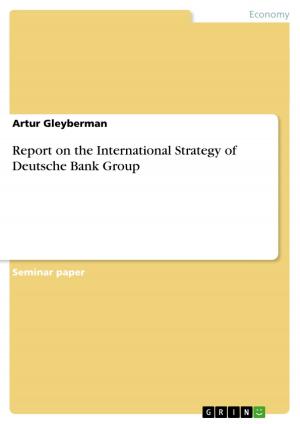| Author: | Nils Schmieder | ISBN: | 9783638498449 |
| Publisher: | GRIN Publishing | Publication: | May 8, 2006 |
| Imprint: | GRIN Publishing | Language: | English |
| Author: | Nils Schmieder |
| ISBN: | 9783638498449 |
| Publisher: | GRIN Publishing |
| Publication: | May 8, 2006 |
| Imprint: | GRIN Publishing |
| Language: | English |
Seminar paper from the year 2005 in the subject Politics - International Politics - Region: USA, grade: 2,0, University of Regensburg (Institut für Internationale Politik), course: Internationale Politik, 32 entries in the bibliography, language: English, abstract: For the past five decades Germany and the United States of America have been reliable allies. They strongly focused on common interests and threats and worked hand in hand to overcome problems and crises. The USA protected West Germany from the Soviet threat by sponsoring economic growth through the Marshall plan, it kept West Berlin alive through the airlift in 1948/49 and helped to establish a civil democracy with an economic success story that was until that point in history unheard of. 'On October 3, 1990, German unification was achieved, due in large part to close German-American diplomatic cooperation despite resistance from France, Britain, and the Soviet Union, all of whom feared that a reunified Germany would upset the stable balance in Europe.' Throughout time Germany and the USA had built a partnership that was founded on trust, friendship, extensive cooperation on numerous levels and common interests. After reunification the partnership seemed so strong and stable, that President George H. W. Bush called Germany 'a partner in leadership'. Of course the transatlantic relations have never been trouble-free. There were differences and arguments on several occasions. One crisis, among others, developed in 1979 over NATO's decision to deploy intermediate-range nuclear missiles in Germany. A wide spectrum of the German population was quite critical about the policies of the American Administration, yet the phenomenon of strong, far-reaching and fundamental Anti-Americanism could mostly be confined to the radical political left. Furthermore 'in these and other cases of friction between the United States, the German chancellor voiced criticism but in the end supported American policy.' In the past few years this has changed dramatically. A widespread conflagration of Anti-Americanism has spread throughout the German society and its political elite. Demonstrations against a war in Iraq drew a new crowd of anti-American protesters. 'Demonstrators came not only from the ranks of the usual suspects-i.e., the till-then virtually dormant peace movements, left and green political parties, and universities and schools- but also from church groups, trade unions, and community associations. To a surprisingly high degree, they represented people who had never before attended a demonstration.' It seems that Anti-Americanism has become the GermanLingua franca.
Seminar paper from the year 2005 in the subject Politics - International Politics - Region: USA, grade: 2,0, University of Regensburg (Institut für Internationale Politik), course: Internationale Politik, 32 entries in the bibliography, language: English, abstract: For the past five decades Germany and the United States of America have been reliable allies. They strongly focused on common interests and threats and worked hand in hand to overcome problems and crises. The USA protected West Germany from the Soviet threat by sponsoring economic growth through the Marshall plan, it kept West Berlin alive through the airlift in 1948/49 and helped to establish a civil democracy with an economic success story that was until that point in history unheard of. 'On October 3, 1990, German unification was achieved, due in large part to close German-American diplomatic cooperation despite resistance from France, Britain, and the Soviet Union, all of whom feared that a reunified Germany would upset the stable balance in Europe.' Throughout time Germany and the USA had built a partnership that was founded on trust, friendship, extensive cooperation on numerous levels and common interests. After reunification the partnership seemed so strong and stable, that President George H. W. Bush called Germany 'a partner in leadership'. Of course the transatlantic relations have never been trouble-free. There were differences and arguments on several occasions. One crisis, among others, developed in 1979 over NATO's decision to deploy intermediate-range nuclear missiles in Germany. A wide spectrum of the German population was quite critical about the policies of the American Administration, yet the phenomenon of strong, far-reaching and fundamental Anti-Americanism could mostly be confined to the radical political left. Furthermore 'in these and other cases of friction between the United States, the German chancellor voiced criticism but in the end supported American policy.' In the past few years this has changed dramatically. A widespread conflagration of Anti-Americanism has spread throughout the German society and its political elite. Demonstrations against a war in Iraq drew a new crowd of anti-American protesters. 'Demonstrators came not only from the ranks of the usual suspects-i.e., the till-then virtually dormant peace movements, left and green political parties, and universities and schools- but also from church groups, trade unions, and community associations. To a surprisingly high degree, they represented people who had never before attended a demonstration.' It seems that Anti-Americanism has become the GermanLingua franca.















